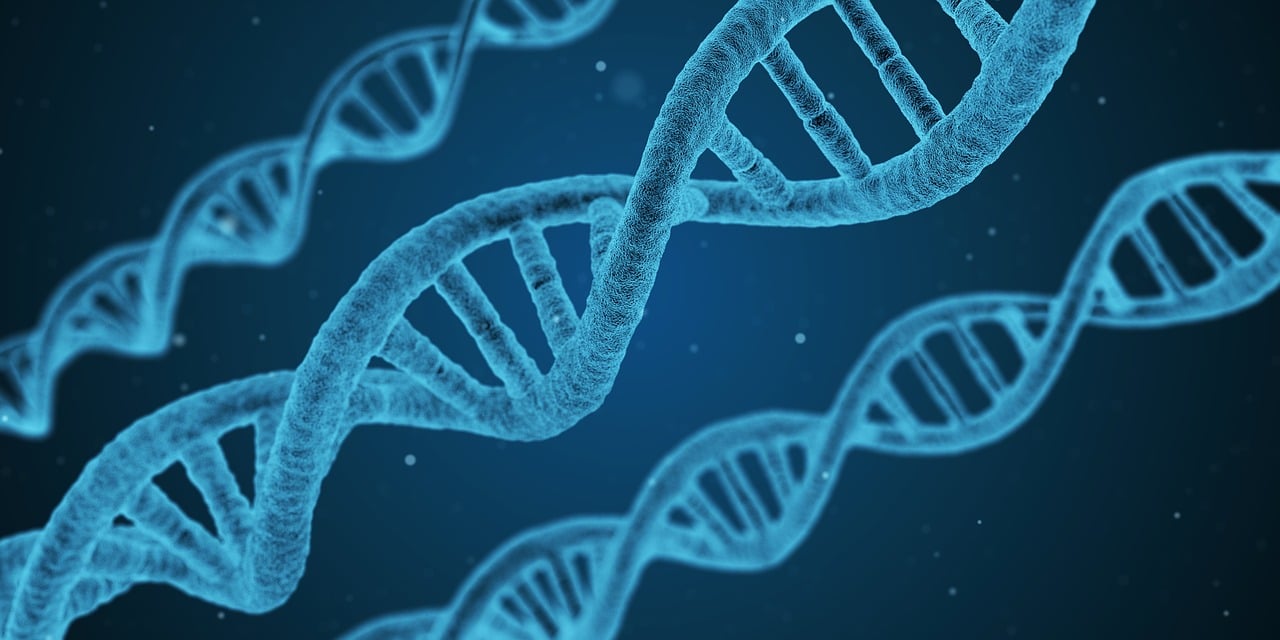Are you curious to know how your genetics play a role in your ability to shed those extra pounds? In this article, we will explore the fascinating connection between genetics and fat loss. Finding out how our genes impact our metabolism, appetite, and overall body composition can provide valuable insights into creating effective weight loss strategies tailored to our individual needs. So get ready to uncover the secrets behind the influence of genetics on fat loss and discover how you can optimize your fitness journey for long-term success.
Impact of Genetics on Metabolism
Metabolism, or the process by which our bodies convert food and nutrients into energy, is an essential aspect of weight management and fat loss. Interestingly, genetics play a crucial role in determining your metabolic rate, which is the number of calories your body burns at rest. Some individuals seem to effortlessly maintain a lean physique, while others struggle despite their best efforts. These differences can largely be attributed to genetic variations that influence energy expenditure.
Role of genes in determining metabolic rate
Your metabolic rate, or the number of calories your body burns at rest, is influenced by a combination of genetic and environmental factors. Certain genes have been identified as playing a role in determining an individual’s metabolic rate. For example, the FTO gene has been found to be associated with obesity and increased risk of weight gain, as it appears to affect the regulation of appetite and food intake.
Influence of genetic variations on energy expenditure
Genetic variations can also influence energy expenditure, or the number of calories your body burns through physical activity and daily tasks. Some individuals may naturally have a higher energy expenditure due to genetic factors, allowing them to burn more calories even at rest. Conversely, certain genetic variations may result in a lower energy expenditure, making it more challenging to maintain a healthy weight.
Effects of genetics on fat storage and breakdown
Genetics also play a role in determining how your body stores and breaks down fat. Some individuals may have a genetic predisposition for storing excess fat, particularly in certain areas such as the abdomen or hips. On the other hand, certain genetic variations may facilitate the breakdown and utilization of stored fat, making weight loss efforts more successful.
Genetic Predisposition to Obesity
Obesity is a complex condition influenced by a combination of genetic, environmental, and behavioral factors. While it is essential to adopt a holistic approach to weight management, genetics do contribute significantly to an individual’s susceptibility to obesity.
Genes linked to obesity risk
Research has identified several genes associated with an increased risk of obesity. For example, the FTO gene mentioned earlier has been extensively studied in relation to obesity risk. Other genes, such as MC4R and POMC, also play a role in regulating appetite and food intake, and variations in these genes have been linked to higher body weight and increased risk of obesity.
Contribution of genetic factors to body weight
Genetic factors contribute to about 40-70% of the variation in body weight among individuals. This means that while genetics may predispose someone to be more susceptible to obesity, it is not solely responsible for weight gain. Environmental factors, such as diet and physical activity, also play a significant role in determining body weight.
Impact of genetic variations on appetite regulation
Genetic variations can influence appetite regulation and food intake, which in turn can affect weight management. Some individuals may have genetic variations that result in a higher propensity for overeating or a reduced ability to feel satisfied after a meal. Understanding these genetic factors can help develop personalized approaches to managing appetite and promoting healthy eating habits.
Muscle Composition and Genetics
Muscle composition, specifically the different types of muscle fibers present in your body, can also be influenced by genetic factors. This, in turn, impacts your ability to burn fat and build lean muscle mass.
Influence of genetics on muscle fiber types
Muscle fibers can be broadly classified into two main types: slow-twitch (Type I) and fast-twitch (Type II) fibers. The proportion of these muscle fiber types is partly determined by genetic factors. Some individuals may naturally have a higher percentage of fast-twitch fibers, which are more efficient at generating power and strength. On the other hand, those with a higher proportion of slow-twitch fibers may excel in endurance activities.
Effects of muscle composition on fat burning
The type of muscle fibers present in your body can influence how efficiently you burn fat during exercise. Fast-twitch fibers have a higher capacity to burn carbohydrates rather than fat, while slow-twitch fibers are known for their ability to utilize fat as a fuel source. Therefore, individuals with a higher proportion of slow-twitch fibers may experience greater fat-burning benefits during exercise.
Role of genetic factors in muscle development
Genetics also play a role in determining muscle development and growth. Certain genetic variations may influence how effectively your body builds and repairs muscle tissue in response to exercise. Understanding these genetic factors can help tailor exercise programs to maximize muscle development and improve overall body composition.
Hormonal Regulation and Genetic Factors
Hormones, the chemical messengers in our bodies, play a vital role in regulating various processes, including fat loss. Genetic factors can influence hormone production and sensitivity, affecting our body’s ability to lose fat effectively.
Genetic influence on hormone production
Genetic variations can impact the production and regulation of hormones involved in metabolism and fat loss. For example, the genes responsible for producing hormones such as leptin, ghrelin, and insulin can influence appetite regulation and fat storage. Variations in these genes may contribute to differences in weight management among individuals.
Effect of hormonal imbalances on fat loss
Hormonal imbalances, often influenced by genetic factors, can significantly impact fat loss efforts. For instance, individuals with imbalances in hormones like cortisol or thyroid hormones may find it more challenging to lose weight. These imbalances can affect metabolism, appetite regulation, and the body’s ability to burn fat effectively.
Genetic variations in insulin sensitivity
Insulin sensitivity refers to how efficiently your body responds to insulin, a hormone that regulates blood sugar levels. Genetic variations can affect insulin sensitivity, with some individuals being more prone to insulin resistance, a condition associated with weight gain and difficulty losing fat. Understanding these genetic factors can help guide dietary and lifestyle recommendations for individuals with insulin resistance.

Genetic Response to Exercise
Exercise is a crucial component of any fat loss program, and genetic factors can influence how your body responds to different types of exercise.
Influence of genetics on exercise performance
Genetic factors can impact exercise performance and determine an individual’s aptitude for certain types of physical activities. Some individuals may have genetic variations that enhance endurance performance, allowing them to excel in activities like long-distance running or cycling. Others may have genetic advantages for strength and power activities, such as weightlifting or sprinting.
Effects of genetic variations on fat loss during exercise
Genetic variations can also influence how effectively your body burns fat during exercise. For example, some individuals may have genetic variations that promote the breakdown and utilization of stored fat as an energy source during prolonged aerobic exercise. These individuals may experience greater fat loss benefits from cardiovascular activities compared to others.
Role of genetics in determining optimal exercise type
Understanding your genetic makeup can help determine the optimal type of exercise for fat loss. Genetic testing can provide insights into your body’s response to different types of physical activities, helping you tailor your exercise program to maximize fat-burning potential and overall fitness improvements.
Gene-Diet Interactions
Diet plays a crucial role in fat loss, and genetics can influence an individual’s dietary requirements and response to certain diets.
How genes affect dietary requirements
Genetic factors can impact an individual’s dietary requirements, such as macronutrient ratios or specific nutrient needs. For example, variations in genes involved in vitamin metabolism may affect vitamin deficiencies or requirements. These genetic factors can contribute to overall health and influence weight management.
Genetic predisposition to certain diets
Genetic variations can also influence how individuals respond to different types of diets. For instance, some individuals may have genetic variations that make them more responsive to low-carbohydrate diets, while others may thrive on a balanced macronutrient intake. Understanding these genetic predispositions can help guide individuals towards dietary approaches that are more likely to result in successful fat loss.
Effects of genetic variations on nutrient absorption
Genetic variations can affect how efficiently your body absorbs and utilizes nutrients from the foods you eat. For example, some individuals may have genetic variations that decrease the absorption of dietary fat, making it important to modify fat intake for optimal fat loss. Genetic testing can provide insights into these variations and help individuals make informed dietary choices.
Epigenetics and Fat Loss
Epigenetics refers to changes in gene expression that can occur due to lifestyle choices and environmental factors. Understanding the impact of epigenetic modifications on weight loss is a rapidly evolving field of research.
Impact of lifestyle choices on gene expression
Lifestyle choices, such as diet, physical activity, sleep patterns, and stress levels, can influence gene expression. These epigenetic modifications can impact metabolic processes, including fat loss. Making positive lifestyle choices, such as a balanced diet and regular exercise, can promote favorable epigenetic changes that support weight management.
Effects of epigenetic modifications on weight loss
Epigenetic modifications can influence various aspects of weight management, including metabolism, fat storage, and appetite regulation. For example, certain lifestyle choices may result in epigenetic changes that enhance fat-burning processes or improve insulin sensitivity, supporting weight loss efforts.
Role of epigenetics in gene-diet interactions
Epigenetics also plays a significant role in gene-diet interactions. The foods we eat can impact gene expression through epigenetic modifications, either promoting or inhibiting metabolic processes. Understanding these interactions can help tailor dietary recommendations to promote favorable epigenetic changes that support weight management and fat loss.
Genetic Testing for Personalized Fat Loss
Advances in genetic testing technology have provided opportunities for tailoring weight loss programs to an individual’s genetic makeup. However, this approach also raises ethical considerations and has its limitations.
Use of genetic testing to tailor weight loss programs
Genetic testing can provide valuable insights into an individual’s genetic predispositions, allowing for personalized recommendations in weight loss programs. By understanding an individual’s genetic variations related to metabolism, appetite regulation, exercise response, and nutrient absorption, professionals can design more targeted and effective strategies.
Benefits and limitations of genetic testing
Genetic testing for personalized fat loss has its benefits and limitations. On the one hand, it can provide valuable information and empower individuals to make more informed choices. It can also serve as a motivator and help individuals understand that their struggles with weight management are not solely their fault. However, genetic testing is not a magic solution, and it should be approached with caution. The science surrounding genetic interactions with weight management is still evolving, and genetic variations are just one piece of the puzzle.
Ethical considerations of genetic testing for fat loss
Ethical considerations must also be taken into account when it comes to genetic testing for fat loss. Issues such as genetic privacy, the potential for discrimination based on genetic information, and the role of genetic determinism need to be carefully addressed. Genetic testing should be conducted within an ethical framework that respects individuals’ autonomy and ensures the responsible use of genetic information.
Environmental Factors and Genetic Expression
While genetics play a significant role in fat loss, it is crucial to consider the impact of environmental factors on genetic expression.
Influence of environmental factors on genetic expression
Environmental factors can influence how genes are expressed or “turned on” or “off.” An individual’s lifestyle choices, including diet, exercise, stress levels, and exposure to toxins, can impact genetic expression. Positive lifestyle choices can promote favorable gene expression patterns that support fat loss and overall health.
Effects of lifestyle choices on genetic impact on fat loss
Lifestyle choices directly interact with genetic factors, and they can either enhance or hinder fat loss efforts. Poor dietary choices, sedentary behavior, chronic stress, and inadequate sleep can contribute to unfavorable gene expression patterns that promote weight gain and hinder fat loss. On the other hand, adopting a healthy lifestyle that includes a balanced diet, regular exercise, stress management, and adequate sleep can support favorable genetic expression patterns and facilitate fat loss.
Importance of a holistic approach to fat loss
Considering the interplay between genetic factors and environmental influences, it becomes clear that taking a holistic approach to fat loss is essential. While genetics may predispose someone to certain conditions or influence their response to certain interventions, environmental factors, including lifestyle choices, play a significant role in determining outcomes. A comprehensive approach that incorporates genetic factors with lifestyle modifications is key to achieving sustainable fat loss and overall well-being.
Future Implications and Research
Advancements in understanding the influence of genetics on fat loss have opened up exciting possibilities for personalized interventions and further research.
Advancements in understanding genetic influence on fat loss
As our understanding of genetics and its role in fat loss continues to evolve, advancements in research are being made. The identification of new genes, genetic variants, and their specific associations with various aspects of fat loss can provide valuable insights into physiological mechanisms and potential therapeutic targets.
Potential for personalized fat loss interventions
The field of personalized medicine offers promising opportunities for tailoring interventions for fat loss based on an individual’s genetic makeup and specific needs. By considering an individual’s genetic predispositions, professionals can design personalized interventions that optimize outcomes and improve the effectiveness of fat loss strategies.
Ongoing research and future directions
The study of genetics and its impact on fat loss is an active area of research. Ongoing investigations aim to further uncover the complex interactions between genetics, environmental factors, and fat loss outcomes. Further understanding these interactions will help refine personalized interventions, guide preventative measures, and enhance the effectiveness of fat loss strategies in the future.
In conclusion, genetics significantly influence fat loss outcomes, impacting metabolism, obesity risk, muscle composition, hormonal regulation, exercise response, dietary requirements, epigenetic modifications, and overall gene-diet interactions. While genetics provide valuable insights into an individual’s predispositions, it is essential to recognize the importance of environmental factors and adopt a holistic approach to fat loss. Personalized interventions guided by genetic information hold great promise for optimizing fat loss strategies, but ethical considerations and ongoing research are necessary to ensure responsible and effective application. As our understanding of genetics and its impact on fat loss continues to expand, the future holds exciting possibilities for tailored interventions and advancements in the field.



